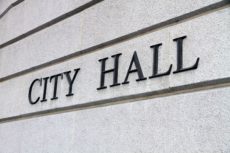Who Are the Demanders of Local Government Services?
 Local governments produce lots of services that people value: schools, police protection, water and sewer services, and more. Who are the producers of these services accountable to, and who determines the characteristics of the services local governments provide?
Local governments produce lots of services that people value: schools, police protection, water and sewer services, and more. Who are the producers of these services accountable to, and who determines the characteristics of the services local governments provide?
Ideally, the people who live in the jurisdictions of those local governments would be the people who would determine the characteristics of the services they provide, but more than one-third of local government expenditures are financed by intergovernmental transfers, and those higher-level (federal and state) governments send that money with strings attached. To get the money, local governments have to spend the money the way the higher level governments want.
In large part, the demanders of local government services are higher level governments. They tell local governments what they want with the money they spend.
The result is that we get policies like No Child Left Behind, which comes with federal mandates and guidelines that direct local government education spending. Teachers “teach to the test” because federal funding demands it. We get militarized local police forces because the federal government provides grants and equipment to arm local police department with military vehicles and military weapons.
One would hope that local governments would be responsive to the demands of the people in their jurisdictions, but because so much of their funding comes from higher-level governments, and because those governments have so much more direct control, the real demanders of local government services are the federal and state governments, not the citizens who reside in those local governments.
Local governments force their own constituents to pay taxes. Locals don’t have any say in whether they want to “buy” what their local governments are selling, short of moving out of the jurisdiction. Local governments don’t need to produce what local taxpayers want to get their money.
Because local governments want money from the federal and state governments, they produce what the bureaucrats in those other governments want and are willing to pay for. The demanders of local government output are bureaucrats in the federal and state governments, and local government output is designed to satisfy the demands of those bureaucrats.
The institutional structure of local government finance ensures that those governments must take account of the demands of the bureaucrats in the higher-level governments who fund them, but can safely ignore the demands of the local constituency.


















